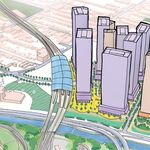allabootmatt
Senior Member
If the next 'round' involves a TTC light-rail line, I wonder which will be deemed the priority. Eglinton would seem to make sense, since it will be the busiest by far and also take the longest to complete due to tunnelling. I'm quite excited at the prospect of what will effectively be an Eglinton subway--after all, those monster LRVs are about the size of subway trains in a lot of other cities.
But, knowing how things can work with TO transit, the priority will probably be something in oh, say, north-east Scarborough.
But, knowing how things can work with TO transit, the priority will probably be something in oh, say, north-east Scarborough.




